Leaky Gut Syndrome
What is Leaky Gut Syndrome?
Learn all about Leaky Gut Syndrome before it becomes mainstream knowledge!

By Travis Wade
“We don’t know a lot, but we know that it exists. In the absence of evidence, we don’t know what it means or what therapies can directly address it.” Linda A. Lee, MD, gastroenterologist and director of the Johns Hopkins Integrative Medicine and Digestive Center.
Dr. Oz says leaky gut syndrome is a clinical diagnosis.
Wikipedia says it’s not.
How does a person know who or what is the more reliable source?
Amazingly, the medical profession is just now agreeing this condition even exists. Yet, “intestinal permeability” has been discussed in medical literature for over 100 years!
The medical field is a rapidly advancing field. It seems like the functional medicine doctors are moving forward while your family doctor follows their protocol. However, we can’t be too upset with our family doctors, but you might consider adding a high-quality functional medicine doctor to your team, to ensure good health.
As an EMT, half the people I see going to the emergency room are there for abdominal problems. Worse still, half of those people leave the hospital undiagnosed. While your family doctor argues with an alternative medicine practitioner about whether leaky gut syndrome exists, let me explain what it is, what causes it, and what to do about it. Leaky gut syndrome is nothing like the sasquatch: you see it every day, it has a profound effect on our society, and you probably have it to some degree.
Conversely, the other half of the argument is there are no studies that prove what to do about it. The pharmaceutical companies are working on a medication to treat leaky gut syndrome. When they develop it, they’ll monetize leaky gut syndrome and it will become mainstream knowledge. Remember, you heard it here first!
Fortunately, there are studies on what improves the gut lining and what to do to maintain a healthy gut. The theory is these methods of improving the gut lining will fix leaky gut syndrome.
WHAT IS LEAKY GUT SYNDROME?
We have junctions in our gut linings that act as “gates” in cells at the molecular level. In the gut, they carry nutrients across to the bloodstream. These gates usually allow small molecules to pass while holding larger molecules back to break them down further before also allowing them to pass.
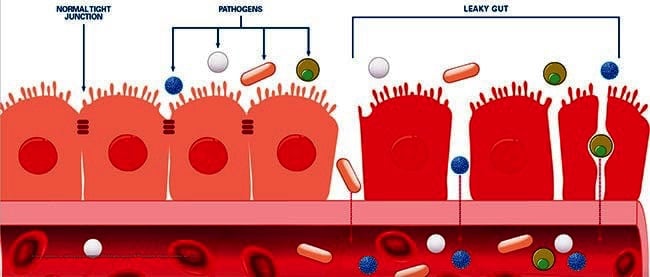
Leaky gut syndrome exists when the permeability of the gut lining has been compromised. The gut lining may be damaged in many ways: This includes cell death, damage to junctions, and the destruction of microvilli, all of which cause the gut to be much more permeable. As a result, when the gut becomes hyper-permeable, larger molecules and toxins may enter the bloodstream and start doing damage.
Ultimately, the liver is forced to work harder to destroy toxins and larger molecules while the immune system takes on foreign invaders in the bloodstream. As a result, the body experiences full-blown, system-wide inflammation.
SYMPTOMS OF LEAKY GUT SYNDROME
Symptoms include autoimmune diseases, allergies, skin problems, candida (yeast) overgrowth, digestive issues, depression, and all kinds of other unexplained issues. Also, I should add that there is an unusually massive surge in these types of problems in our society. Sadly, almost everybody I know has at least one of these symptoms.
HOW TO TEST FOR LEAKY GUT SYNDROME
According to Robynne K. Chutkan, MD, FASGE Assistant Professor of Medicine, Georgetown University Hospital Founder and Medical Director, Digestive Center for Women, there’s a simple test for leaky gut syndrome: a urine test.
Mannitol is a small molecule that passes through a healthy gut. On the other hand, lactulose is a larger molecule that doesn’t normally pass through. After drinking the mixture of mannitol and lactulose, we wait six hours and do a urine test. If there are high levels of both mannitol and lactulose, this indicates leaky gut syndrome.
CAUSES OF A LEAKY GUT
Glyphosate
Glyphosate is the active ingredient in the herbicide “Roundup” which has recently been publicized as a cancer-causing agent. Originally patented as an antibiotic, glyphosate has instead proven to be the cause of many devastating issues, from depleting vital minerals and good bacteria to causing leaky gut syndrome.

Monsanto is the company responsible for creating glyphosate. “The Monsanto Papers” shows lawsuits against the company, who eventually sold out to Bayer. A weird thing in the United States is if you change the name of your company, anyone with a lawsuit against you has to start their lawsuit from scratch. These lawsuits are mostly cancer patients who will likely die before any settlement. Monsanto also created things like artificial sweeteners, Agent Orange, DDT, dioxins (PBCs), phthalates, and polystyrene (Styrofoam).
Worryingly, glyphosate has been sprayed by the tons all over North America and many other parts of the world where it isn’t banned. It’s in every American-made wine, our waterways, almost all of our food, and GMOs, of course. Unfortunately, it’s impossible to avoid but do your best to consume as little as possible.
In addition, because glyphosate has been sprayed so much, it’s killing our reed wildlife, which is detrimental to our ecosystems. Obviously, it’s going to settle where water settles, and that’s where reeds usually grow, but glyphosate kills them. Ultimately, no more reeds = no more ecosystems.
I had an environmentalist come see me for a consult one day. I asked her if she heard of the “Dead Zones of the Ocean”. She had learned about them in school. I asked her what they told her caused the dead zones of the ocean and she said “agricultural runoff”. I asked her what exactly is agricultural runoff. She said “You know, pesticides and sprays”. I asked “Can you name any?” She said “No”. She had actually never heard of Glyphosate before!?
Her job was to count up the reed wild life along the North Saskatchewan river and map them because we are losing them rapidly. She told me the prevention strategy our government came up with is nobody is allowed to build on the reed wildlife. My heart sank.
Plant Toxins

Lectin and phytate or phytic acid are plant toxins. Because plants can’t run or fight like the rest of us, they have thorns or toxins as their defense against predators. Of course, we eat lectin all the time. In low doses, we are fine. In high doses, on the other hand – not so much.
Dietary sources high in lectin include soy, grains, seeds, beans, dairy – specifically, the casein which is the protein in the curd of dairy – and the highest in lectin is food containing GMOs and gluten. Gluten is the protein you’ll find in rye, wheat, barley, oats, kamut, and spelt. Lectin will bind to your gut lining and damage or kill the cell causing a leaky gut.
Dysbiosis
Dysbiosis is an imbalance between good bacteria and bad bacteria in the body. In theory, dysbiosis is one of the leading causes of leaky gut. Glyphosate, prescription antibiotics, chlorine and fluoride in water are the biggest contributors that kill healthy bacteria. This imbalance, along with sugar, increases yeast in your gut. In the end, yeast attaches to your gut lining and does damage in the same way as lectin. Anyone want some bread?
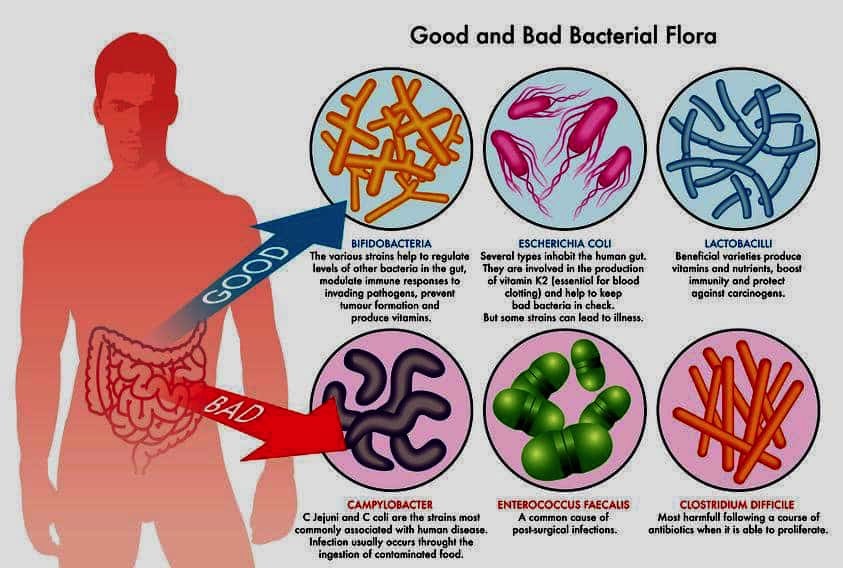
Inflammation
Inflammation exacerbates the issue. When the body is in attack mode, our cells often get caught in the crossfire. Unfortunately, the antigens our bodies create through inflammation actually attack our own cells.
Worse still, inflammation also makes the body weak and allows all kinds of problems to occur, just as mental stress is the number one cause of medical problems in North America. Things that cause inflammation are another type stress on the body.
Some causes of inflammation include medications, NSAIDs or nonsteroidal anti-inflammatory drugs (like Tylenol, Advil, Motrin); processed foods, preservatives and flavorings, mercury, pesticides and BPA from plastics. Obviously, infections and other sicknesses are in there too. Also, importantly, I’d like to point out that some functional medicine doctors believe NSAIDs are the number one drug that kills people.
Looking at all of the above, it’s clear that your gut is under constant attack. For most people, this is happening at a higher rate than the repair. And, of course, age contributes to leaky gut syndrome as well. I’m sure with all the undiagnosed abdominal problems coming through the emergency room, we can all agree it’s a big deal to take excellent care of your gut. Let me tell you how.
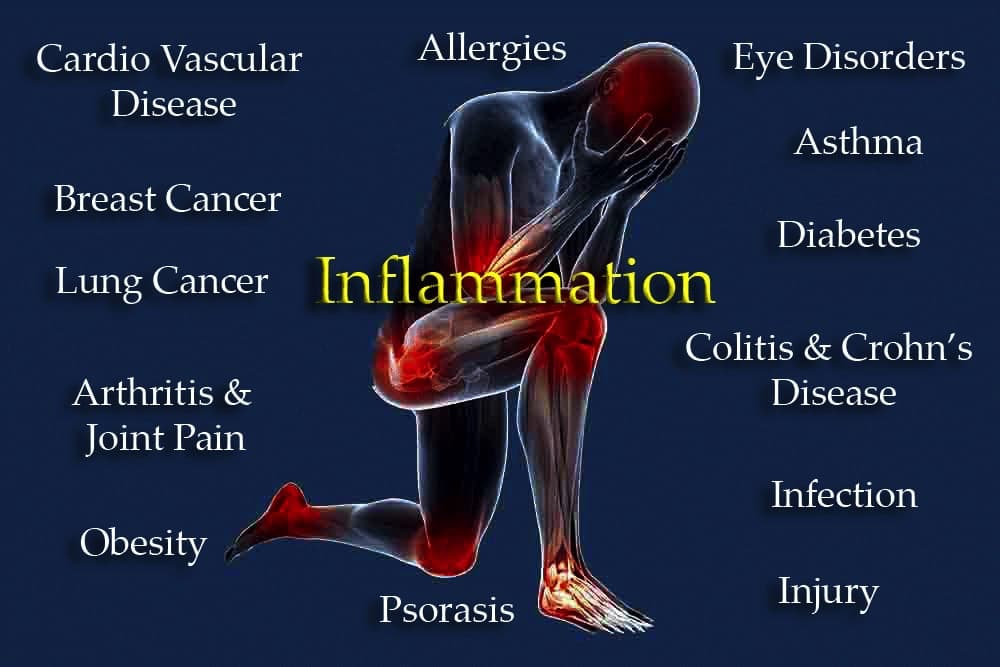
HOW TO FIX YOUR LEAKY GUT
Step 1: Eliminate Causes
Many studies have been done to learn what repairs and maintains a healthy gut. As a result, the four R’s (Remove, Replace, Reinoculate, Repair) is the agreed treatment among functional medicine doctors for leaky gut syndrome. The idea is twofold: First, to heal inflammation and then to restore the integrity of your gut lining.
For a start, eliminating sugars, starches, grains, and other irritating foods alleviates inflammation and starves out yeast overgrowth. The most common allergens are gluten, dairy, sugar and other sweeteners, soy, corn, peanuts, and egg whites. No processed foods either. Almost any food that comes in a package is processed.
What’s more, artificial sweeteners deserve special mention because they kill the good bacteria (flora) in your intestine. We want to grow the good bacteria for protection against bad bacteria that destroys our gut.
Worse still, artificial sweeteners are more addictive than sugar, which lights up the pleasure centers in the brain four times as much as cocaine. On top of that, artificial sweeteners cause diabetes faster than sugar because they spike your insulin even more than sugar. Also, sweeteners increase your pallet for sweet foods which isn’t good for someone who may be addicted to sugar.

Step 2: Add the Repair
Now that you’ve eliminated things that cause leaky gut syndrome, you can work on healing the gut with proper diet and supplements.
The next thing to incorporate is the GAPS diet by Dr. Natasha Campbell-McBride. It starts with soup and Dr. Josh Axe recommends 3 cups of bone broth a day. Moreover, Dr. Natasha advises eating nothing but soup at first; then you can incorporate other foods after your gut heals a bit.
The bone/meat broth is the key ingredient, as it contains collagen, minerals, and the amino acids proline, L-glutamine, and glycine that can help heal your damaged cell walls. The good news is, all these nutrients are great for the gut and all the body’s connective tissue, including the skin.
After incorporating a healthy diet, you may want to consider some supplements to help maintain a healthy gut. I have to mention that taking some of the supplements listed below may do more damage than good, and you should contact a doctor before taking any supplements. However, the bone/meat broth naturally contains a lot of the desired nutrients, so you can consume it safely.
Quercetin
Quercetin is a plant pigment (flavonoid) and has antioxidant and anti-inflammatory effects. It is used as a supplement for many ailments. According to Dr. Axe, it’s also been shown to improve gut barrier function by supporting the creation of tight junction proteins.
L-glutamine
L-glutamine is an essential amino acid and an anti-inflammatory. It has many benefits, including assisting brain function, promoting muscle growth, preventing muscle wasting, enhancing athletic performance in endurance sports like snowboarding, improving metabolism, curbing cravings for sugar and alcohol, fighting cancer, improving diabetes and blood sugar, and dramatically decreasing recovery time. I wish I had been taking it before squat day on Tuesday…
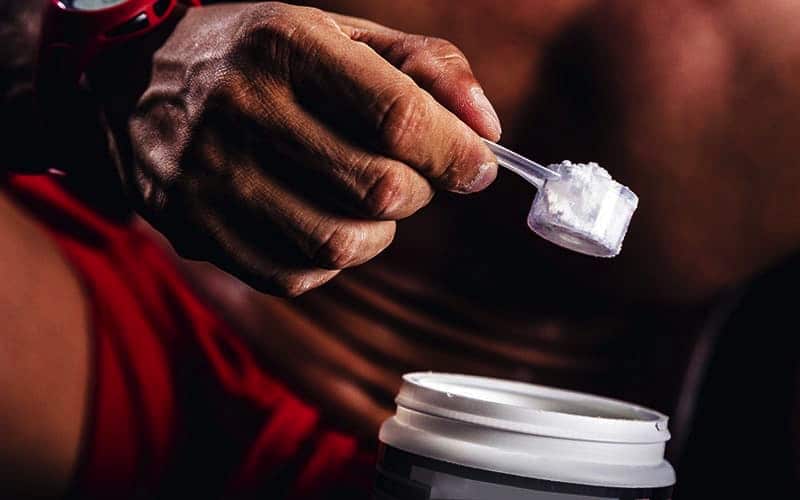
The main benefit of L-glutamine is how it helps build and repair the intestines. L-glutamine coats your cell walls and acts as a repellent to irritants. Also, L-glutamine has been shown to repair the gut after damage from chemotherapy and radiation and, in theory, is beneficial in leaky gut syndrome.
Coconut Oil
Similar to omega 3s, coconut oil comes with a long list of benefits, one of which is its positive influence on weight loss. When it comes to improving lifestyle, its anti-inflammatory properties make it one of the healthiest disease fighting sources of energy for your body. It is also easy for the body to use.
Omega 3s
The list of benefits of omega 3s is far too long to duplicate in this article. Instead, please visit my article specifically on omega 3s. For now, I’ll just state omega 3s are high in beneficial anti-inflammatory properties and reducing cortisol. This reduces stress but ultimately, omega 3s are building blocks of the body and help in the repair and maintenance of a healthy gut.
Fibre
Fibre also offers many benefits, including weight loss; but here, I’ll just talk about its contribution to a healthy gut. Your gut is a muscle that is activated by the parasympathetic nervous system or the digestive system. In other words, you can’t work this muscle the same way you can work your biceps.
The way you work the smooth muscle of the intestines is to consume insoluble fibre. It improves motility or the wave action of the tube moving contents through it. Another thing fibre will do for you is maintain a fresher environment – out with the old; in with the new – less time for things to ferment.
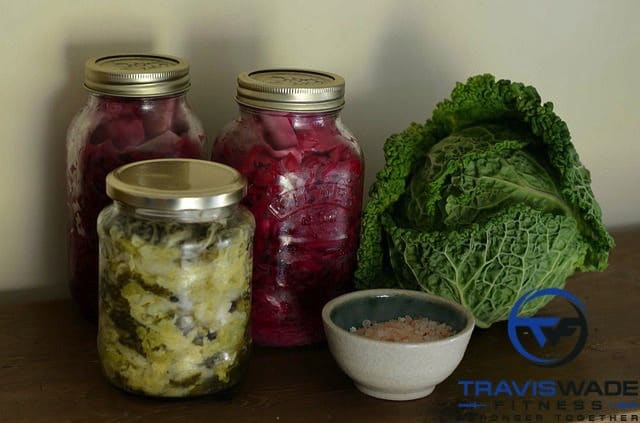
Probiotics
Doctors recommend that you have 85% good bacteria in your gut. If you have lots of bad bacteria, nothing you do will heal your gut because the bad bacteria will continue to destroy it. Yeast overgrowth (Candida) or SIBO (small intestine bacteria overgrowth) are common problems that cause leaky gut syndrome.
Unfortunately, most probiotics are completely ineffective. Dr. Kellman interviewed a guest doctor who conducted a study in Africa and Canada; and, according to this doctor, taking a probiotic is like sending an army out without weapons! Consequently, you need the medium that a bacterial culture grows in, like yogurt. When bacteria take up residence in the gut, it’s like equipping the bacteria with weapons. So, eat fermented foods!
Your microbiome is essentially an ecosystem in your gut. There are trillions of bacteria in there, outnumbering your own body cells by approximately 10 to 1. Fermented foods, including kimchi, sauerkraut, and homemade yogurt and kefir, will improve your microbiome. This has so many benefits that another article will have to be written…

A Good Multivitamin, Vitamin D, and Zinc
One of the things I’d like to mention is how zinc improves dry skin (it’s the active ingredient in dandruff shampoo but you’re probably better off getting it in your food) and prevents prostate cancer in men.
Chronic skin problems are rooted in gut problems. Zinc improves gut health as well so if you have dry skin and you add it to your diet, you get treatment for all of your connective tissue. Sadly, Zinc is typically lacking in a North American diet. It can be found in grass-finished red meat and, of course, wild meat is best. Don’t bother with zinc-oxide as your body doesn’t absorb it. (It does make a great sunscreen, however!) Inasmuch, zinc-citrate isn’t good either; citrates are good for bowel movements but not for absorption.
A high-quality multivitamin has many benefits. Your body needs nutrients; and when you get those nutrients your body functions at a much higher capacity. The same can be said for vitamin D which is the leading nutrient deficiency in North America. Over 95% of us are not getting enough. Conversely, do not over do it on these vitamins. Too much is just as bad as not enough. For more on vitamin D, see my article on it. I take my multivitamin once every 3 days or sometimes after a good sweat at hockey.
Digestive Enzymes
Digestive enzymes ensure full digestion of our food, decreasing the chance that partially digested food particles will damage your gut lining. Most people have low digestive enzymes which causes acid reflux. Acid reflux is usually treated with medication to lower stomach acids. Although this relieves symptoms, this just increases the cause of the problem. A natural substitute is to take lemon water or apple cider vinegar water in the morning or before meals. It is also a great additive to improve digestive enzymes for anyone looking to improve gut health.
I KNOW THIS WAS LONG BUT HERE IS MY CONCLUSION
In closing, maintaining a healthy gut is imperative to your health. Spend five minutes in an emergency room. “Unexplained abdominal problems” are an epidemic which is often treated with pain meds and the old phrase, “We will have to keep an eye on that.”
Functional medicine doctors highly recommend a detox to kick-start your journey to a healthy gut. I mean a proper detox – not some gimmick you buy. If you want me to hook you up with a proven detox, DM me or see me in person for a free transformation session.
I wish you lots of health, love and happiness!
Travis Wade
The only holistic personal trainer in Edmonton.
Want To Get Started On A New Lifstyle Right Away?
Or
Would You Like A Plan To Achieve Your Fitness Goals?
Sign Up For Online Personal Training!



